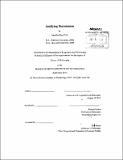Justifying Bayesianism
Author(s)
Carr, Jennifer Rose
DownloadFull printable version (4.630Mb)
Other Contributors
Massachusetts Institute of Technology. Department of Linguistics and Philosophy.
Advisor
Richard Holton.
Terms of use
Metadata
Show full item recordAbstract
Bayesianism, in its traditional form, consists of two claims about rational credences. According to the first claim, probabilism, rational credences form a probability function. According to the second claim, conditionalization, rational credences update by conditionalizing on new evidence. The simplicity and elegance of classical Bayesianism make it an attractive view. But many have argued that this simplicity comes at a cost: that it requires too many idealizations. This thesis aims to provide a justification of classical Bayesianism. Chapter One defends probabilism, classically understood, against the charge that by requiring credences to be precise real numbers, classical Bayesianism is committed to an overly precise conception of evidence. Chapter Two defends conditionalization, classically understood, against the charge that epistemic rationality consists only of synchronic norms. Chapter Three defends both probabilism and conditionalization against the objection that they require us, in some circumstances, to have credences that we can know are not as close to the truth as alternatives that violate Bayesian norms.
Description
Thesis (Ph. D.)--Massachusetts Institute of Technology, Dept. of Linguistics and Philosophy, 2013. Cataloged from PDF version of thesis. Includes bibliographical references (pages 97-100).
Date issued
2013Department
Massachusetts Institute of Technology. Department of Linguistics and PhilosophyPublisher
Massachusetts Institute of Technology
Keywords
Linguistics and Philosophy.